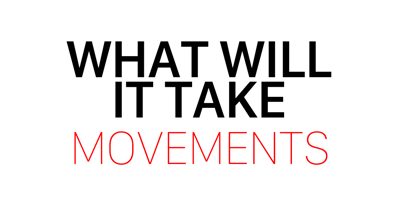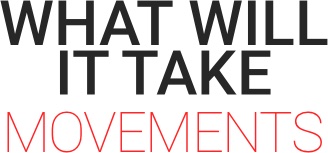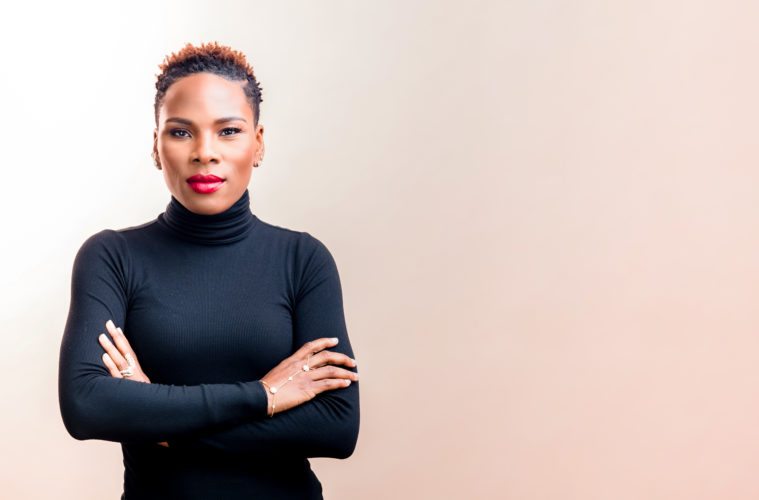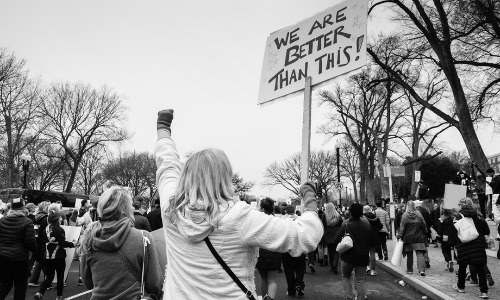By Marianne Schnall
Luvvie Ajayi Jones is an internationally recognized author, podcast host, and speaker who has appeared on stages at Cannes Lions, TEDWomen, South By Southwest, The Makers Conference, and countless others around the globe. Her first book I’m Judging You, was a New York Times bestseller, and her latest work Professional Troublemaker: The Fear-Fighter Manual—which upon its initial publication made every bestseller list—was recently released in paperback. She has also recently published a version of her book aimed at young people called Rising Troublemaker: A Fear-Fighter Manual for Teens.
According to Luvvie, a professional troublemaker is “somebody who is committed to doing or saying what’s hard” and someone who is willing to push past their comfort zones in order to speak up and help make positive change in the world. She told me, “For us to live the audacious lives we want, we’re going to have to make some really good trouble, and that’s going to come with us doing things that scare us over and over again.”
In our candid interview, Luvvie discusses the themes in her book, including its newly added “Truth-Telling Guide,” and shares advice on making courage a life habit, why it’s okay to “be too much,” the importance of speaking up, the value in taking risks and learning from our failures, how we can support Black women’s leadership, and much more.
Marianne Schnall: Your inspiring book Professional Troublemaker recently came out in paperback. What does it mean to be a professional troublemaker, and what are you hoping readers will take away from this book?
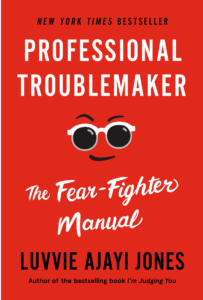 Luvvie Ajayi Jones: To be a professional troublemaker is to be a disruptor, somebody who is committed to doing or saying what’s hard. I think about the late great John Lewis who said, “Always be ready to make necessary good trouble,” and that’s what professional troublemakers do. They’re not contrarians; they’re not trolls. There are people who are like, “There are things to fix in this world, and I want to help fix it.” So ultimately, we’re going to constantly have to do things that scare us. We’re going to have to constantly push past our comfort zones, whether it’s in a room where we know we’re the only low and dissenting voice or at a meeting where you have to say, “I don’t really love that idea,” or at the dinner table with your family when somebody makes a joke that’s not appropriate. You are going to have to constantly push past the fear that tells you to be quiet or to not ask for that thing that you really care about. For us to live the audacious lives we want, we’re going to have to make some really good trouble, and that’s going to come with us doing things that scare us over and over again.
Luvvie Ajayi Jones: To be a professional troublemaker is to be a disruptor, somebody who is committed to doing or saying what’s hard. I think about the late great John Lewis who said, “Always be ready to make necessary good trouble,” and that’s what professional troublemakers do. They’re not contrarians; they’re not trolls. There are people who are like, “There are things to fix in this world, and I want to help fix it.” So ultimately, we’re going to constantly have to do things that scare us. We’re going to have to constantly push past our comfort zones, whether it’s in a room where we know we’re the only low and dissenting voice or at a meeting where you have to say, “I don’t really love that idea,” or at the dinner table with your family when somebody makes a joke that’s not appropriate. You are going to have to constantly push past the fear that tells you to be quiet or to not ask for that thing that you really care about. For us to live the audacious lives we want, we’re going to have to make some really good trouble, and that’s going to come with us doing things that scare us over and over again.
Schnall: For the paperback release, you added a new chapter called “A Truth-telling Guide.” Why did you decide for that to be the focus of this new chapter? Why this topic now for you?
Ajayi Jones: I talk a lot about speaking truth to power and being a truth teller. A lot of what I am challenging people to do in this world is to constantly use our voice and use our power in rooms that we are in, and a lot of people are wondering, “Okay, so how do I do it? What is the thing that I go through that takes me from, ‘I don’t know if I should say this’ to, ‘You know what? I’m going to say it anyway and do it.’” So I wanted to write a practical truth-telling guide that allows you to decide when to speak up, when to be quiet, what to do about the fears that you have, which often include fear of consequence, and how do you put it all in perspective so when you are in the room, you can say, “Okay, I’ve weighed all the different options, and speaking up is still the most important thing.”
So this chapter is the truth-telling guide that I wish I had 10 years ago, 15 years ago, 20 years ago, that is just practical. That tells you, step one: What do you do when something happens in a room you’re in that you don’t love? What’s step two after that, when you know that you’re stuck between this moment of speaking up and facing dissent or being quiet and just going along with what is happening? So that’s why I wanted to write a practical truth-telling guide that will walk you through these moments.
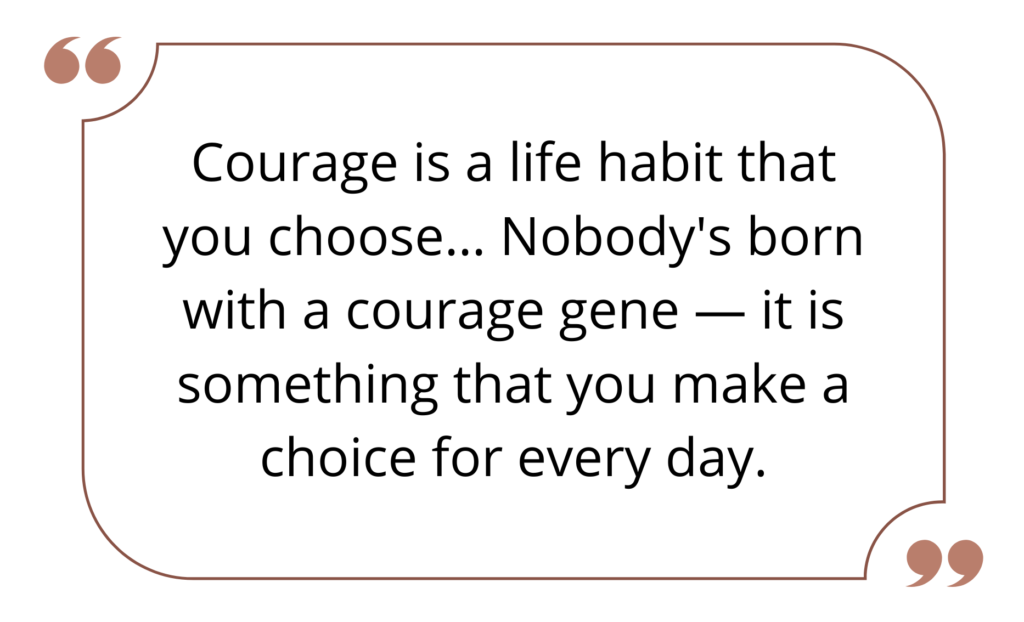
Schnall: Absolutely. This is definitely the time for telling the truth. The last time I spoke to you, you had just given your now viral TEDtalk on getting comfortable with being uncomfortable and also about overcoming fear. How would you describe your personal relationship with overcoming fear, and what general advice would you offer?
Ajayi Jones: My personal relationship with overcoming fear is a constant life habit. My journey, my testimony as a speaker, as a writer, as a human being, is these moments where I have been afraid of doing or saying something, and I did it anyway and was rewarded for it. And there are a few times when I’ve been punished for it. I think courage is a life habit that you choose. You cannot have courage in the absence of fear. My relationship with it is, every single day, when I show up to say something that feels hard on that day, I’m choosing to be courageous. I didn’t just wake up and say, “My personality is courage.” No, nobody’s born with a courage gene. It is something that you make a choice for every day.
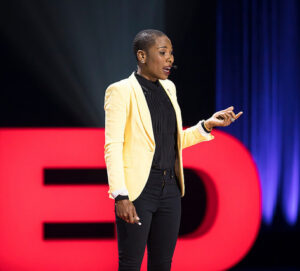
Luvvie giving her TEDtalk “Get Comfortable with Being Uncomfortable” in 2017.
And I’m not an expert. I call myself a guide because I speak from my experience about how my life has been transformed because of my insistence on constantly doing scary things. And I’m hoping that it shows people what’s actually possible for them, especially for me as a Black woman. I’m on two margins, so I do know that the stakes are often higher for me, but I say, if I can do it even when the stakes are that high, then I’m hoping other people will say, “Yes, I can also do it.”
Schnall: I had the good fortune of interviewing Maya Angelou twice, and one thing that she said in both interviews was that courage was the most important of all the virtues and that without it, you can’t do anything else consistently. She also talked about the idea of starting with smaller things and building up your resilience, like it’s a muscle you develop. In your book, you write, “Fear is a hater, a liar, and a cheat. That thing that you keep thinking about, but you keep stopping because you are afraid—do that thing.” So why is overcoming fear important, both individually and collectively?
Ajayi Jones: When we allow ourselves to be complacent, when we allow fear to stop us from doing or saying key things, it absolutely reverberates through our lives. Being afraid will stop us from asking for a raise when we know we’ve earned it. It’ll stop us from even negotiating our salary when we’re given our first offer, which is an economic justice issue. If we don’t speak up in a room where somebody is being treated terribly, it could be a social justice issue. If we are not speaking up as we’re watching the world crumble, it’s a systems-of-oppression issue. So all of these have tangible impacts on our day-to-day lives, professionally and personally. We can’t leave it behind.
Schnall: I remember you’ve also said, “Being yourself is a revolutionary act,” and my very first book was called Daring to Be Ourselves, which is a similar concept. It sounds counterintuitive—being yourself should not require courage, but in today’s society where everybody is trying to fit in, sometimes it’s easier said than done.
Ajayi Jones: Absolutely. I think being yourself is a revolutionary act because of the fact that we’re being pressured to fit into boxes that the world wants us to fit into. We’re being pressured to doubt ourselves, especially women. The world thrives when we are constantly questioning ourselves and how good we are and our worth and our value. So when we can actually say, “I’m going to be this person,” it is something that is impactful; it’s changemaking. My insistence on being who I am, no matter what room I’m in, makes me stand out, which is kind of crazy. I don’t consider what I do extraordinary, but the fact that it is, simply because I show up as myself authentically, I want to live in a world where that’s not extraordinary.
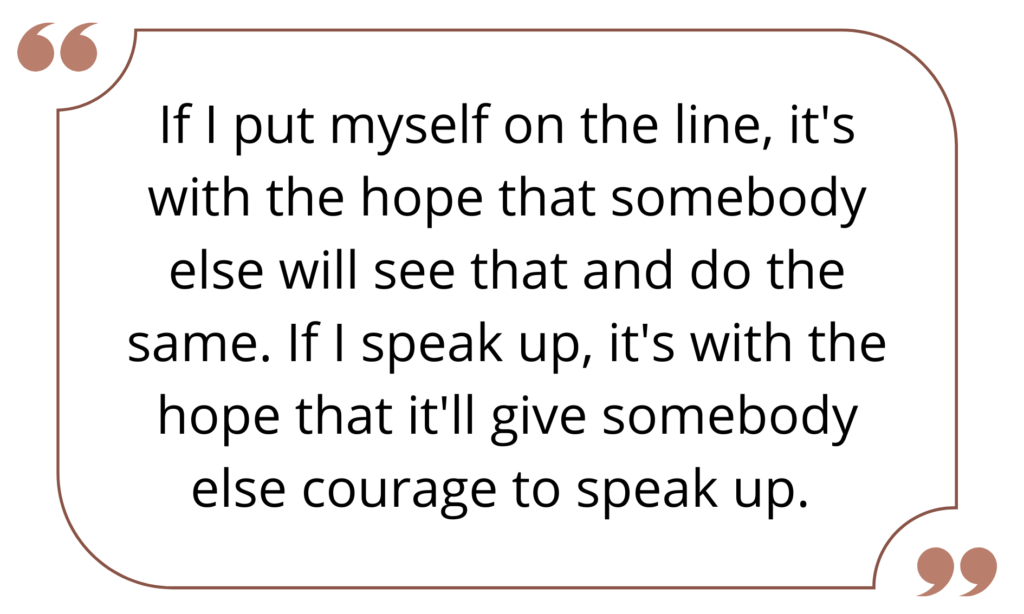
Schnall: You are consistently speaking your truth with such boldness. What is your call to action?
Ajayi Jones: My call to action is that we all exist as the people that we want to live with. If we all operate in this world as somebody that we would want to be in close community with, we might operate better, which means we need to show up for each other more. I consider community business all of our business. If one person is sick, we should all care. If one person’s house is on fire, we should all call 911. Instead of constantly passing the baton to other people to do the work, I think we need to feel convicted to do it ourselves. And if everybody feels convicted, our culture becomes more collective. The United States especially is an individualistic country. And I think what we’re seeing right now is what happens when everybody thinks, “I am for myself,” and nothing more. If I put myself on the line, it’s with the hope that somebody else will see that and do the same. If I speak up, it’s with the hope that it’ll give somebody else courage to speak up. Usually we’re waiting for that one person to start the thing, but what happens if we all go, “I’m going to be the one that starts the thing.”? It would be transformative for us.
Schnall: What paradigm shift do you think is most important that you would most want to see in the world?
Ajayi Jones: The paradigm shift is that we are all each other’s business. That’s what I hope we can achieve in this world—where we feel convicted about each other’s well-being and we operate with that. I think it’s really important for us to start thinking about the collective, as we’re thinking about the individual. In what ways am I adding to the dumpster fire of the world? In what ways am I helping to fix it? Imagine if we were all a little bit more selfless.
Schnall: You write and talk a lot about having the courage to risk failure and how in our society failing is considered the absolute worst thing that you could do. How would you reframe our relationship with failure, and why is that important?
Ajayi Jones: I don’t think failure is real unless you fell flat on your face and learned nothing from it. I think we’re so afraid of failure, as in we’re afraid of being humiliated or disappointed. We’re afraid of looking stupid or looking like we don’t know what we’re doing, so then we don’t take risks. We don’t do things that feel big. We’ll stay in these little boxes because we’re like, “In the box, I know I won’t fail.” But in the box, you’re actually failing because you’re not growing; you’re stuck there.
So we have to give ourselves permission to fail. We have to give ourselves permission to not always get it right. We live in a world where white men take big risks—not because they’re braver than us, not because they’re smarter than us. It’s because they have safety nets that tell them that failure is temporary. The rest of us don’t feel like we have the safety nets, so then we don’t do it. And it’s also because of the system that’s been built.
When we start giving ourselves the permission to fail, we’re really giving ourselves permission to do big things and just see what happens from it. I’ve had major fails. In the moment when you fall flat on your face, when you might feel humiliated, it does feel tough, it is painful, it’s not fun, but usually on the other side of it, you will have learned something more. You will learn something you probably shouldn’t do or something you should do better. You will learn something that is necessary for your journey to continue. And I think failure is typically that point—it’s a learning moment, and it’s required. For you to be somebody of note, of impact, in this world, you’re going to have to fail at least one time. Nobody who is somebody of note can say, “I’ve never failed.”
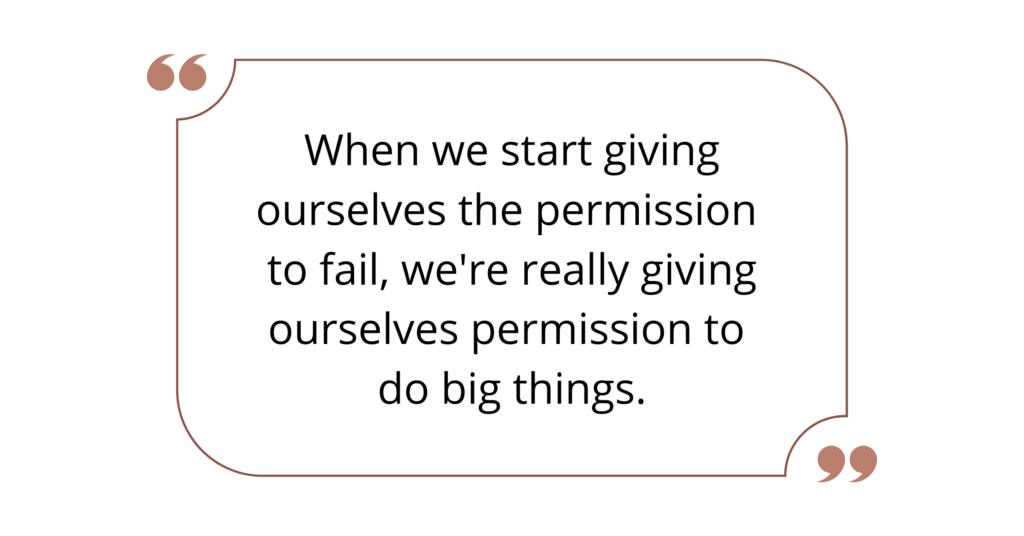
Schnall: Related to that, I feel like a lot of the things that we tend to avoid talking about are the messy parts of life and of ourselves, yet you always share your own personal struggles and challenges so candidly. I recently interviewed V, formerly Eve Ensler, and we were talking about this concept of turning pain into power and the idea that some of our growth comes from our wounds and traumas and challenges. What is your experience with that?
Ajayi Jones: Turning your pain into power is, in these moments of failure, in these moments of trauma, what is on the other side of it for you? And sometimes even sharing our experience will help somebody else go through theirs, and that is power. None of our experiences should be wasted. I’m also a fan of never wasting my words, so my experiences can’t be wasted either. It can’t stop with me. That’s why I’m candid about sharing some of these moments, because somebody somewhere is feeling alone in theirs. Meanwhile, they don’t realize I’ve gone through that myself. So I think one of the things we can do to feel less traumatized about some of these moments of failure is to share with somebody and use it as a point of connection, as a point of common ground.
None of us are exceptional in our failing, but we should be using that as a lesson that will help somebody else. I’m hoping my life is a survival guide for somebody else. I’m hoping my words are a balm for somebody else. I wrote Professional Troublemaker with the hopes that somebody else will read it and go, “Got it. I’m going to do something different,” or “Got it. I’m not too much,” or “I’m not a failure.” “Got it. I can actually fall flat on my face and still be somebody of value.”
So I’m hoping that I loan people courage, whether they’re reading my book or listening to my podcast or just hearing my random social media rants, my goal is to have somebody else feel less alone and feel more seen and affirmed.
Schnall: I’m always struck by how passionately committed you are to sharing your truth, helping motivate people, comforting them, helping them not feel alone, and creating solidarity and community. What is the source of all your energy? What drives you to do what you do?
Ajayi Jones: The source of my energy is knowing that I’m doing purpose work and it’s work that I love. I love the work that I do. I really enjoy it, which is also why I find it hard to unplug from it. I have fun doing what I do, and when I’m not having fun, you don’t hear from me. I don’t force anything. I don’t force partnerships. I don’t force posts. This work is organic, so I don’t say anything unless I feel like saying something.
Schnall: I’m pleased to be able to share with you a firsthand story because you just brought up this idea of being too much, and my youngest daughter, Lotus, has literally said that line to me, that she worries she’s too much. And you’ve got a lot on this topic, so I was thrilled to be able to share these words from your book with her: “Too muchness is a super power and haters don’t want to see you don your cape. So what do you do? Be so much. Be the full totality of you.” Can you speak about this concept of too muchness?
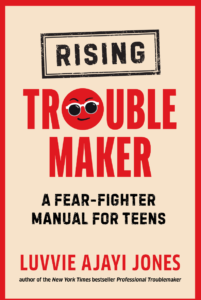 Ajayi Jones: Well, let Lotus know there’s now a version of the book for her: Rising Troublemaker: A Fear-Fighter Manual for Teens. To be too much, so many of us have heard this about different [aspects of] ourselves—you’re too loud, you’re too mouthy, you’re too tall—these are things about us that are core to who we are. So when the world weaponizes it against us, we think our job is to find a way to diminish that thing or fix it, even though it’s not to be fixed; it is your superpower. When we were little, many of us were told, “You talk too much,” well, now I’m a professional speaker. That “too muchness,” had I let it make me quiet, imagine what the world would be missing out on. Imagine the impact. Imagine how I wouldn’t be walking in my purpose. So many times we hear that we are too something and we go thinking we have to fix it. And it’s not for us to fix—it’s for us to double-down on. As long as it’s not harming somebody personally or professionally, that thing that somebody’s criticizing you for is probably the thing that holds the key to what you’re supposed to be doing.
Ajayi Jones: Well, let Lotus know there’s now a version of the book for her: Rising Troublemaker: A Fear-Fighter Manual for Teens. To be too much, so many of us have heard this about different [aspects of] ourselves—you’re too loud, you’re too mouthy, you’re too tall—these are things about us that are core to who we are. So when the world weaponizes it against us, we think our job is to find a way to diminish that thing or fix it, even though it’s not to be fixed; it is your superpower. When we were little, many of us were told, “You talk too much,” well, now I’m a professional speaker. That “too muchness,” had I let it make me quiet, imagine what the world would be missing out on. Imagine the impact. Imagine how I wouldn’t be walking in my purpose. So many times we hear that we are too something and we go thinking we have to fix it. And it’s not for us to fix—it’s for us to double-down on. As long as it’s not harming somebody personally or professionally, that thing that somebody’s criticizing you for is probably the thing that holds the key to what you’re supposed to be doing.
So Lotus is going to grow up and she might be a therapist, she might be an intuitive reader, but whatever that thing is, no one should stamp it out of her; nobody should convince her that that thing is defective; nobody should act as if it is not her in her full glory and that it’s not to be celebrated. It is to be celebrated, not just tolerated, and definitely not insulted. I just want to give us full permission to be too much.
Schnall: Thank you. I’m so excited that you have a book for teens. Why did you decide to do a book aimed at teens, and what are you most hoping to instill in younger generations today?
Ajayi Jones: What really made me decide to do the book was having parents tell me that they wish they’d had these messages in the book when they were 12 or 13 or 14. I even had one parent tell me that one of her daughters started at a new school and came home and was like, “The kids don’t want to play with me. I think I’m just too much for them.” She said she read her daughter the Be Too Much chapter, and the daughter goes to school and three days later she comes back and says, “I found my people. I wasn’t too much.” And it was just from her switching her understanding that if somebody did not really love that piece of her, somebody else would. And I thought, imagine how transformative it would’ve been for us to get this message when we were young, when we were teenagers.
Moms, dads, and teachers were telling me, “I’m reading this to my kids,” and I was like, “You know what? Let me write one just for them.” It of course includes that Be Too Much chapter, but I wanted to speak directly to them, to the different pain points, the things that they didn’t tell us when we were little that I wish we had known. Even things like saving money. I didn’t know about negotiating salaries until I was 30 something; I should have known this when I was 14. So Rising Troublemaker is an affirmation for them. It’s a permission slip for them. And honestly, it’s the book I would give my kids to be like, “Let me just baseline you, so you at least have some idea of what is actually happening in this world around how people are going treat you, how people are going project things at you, how you are going to walk with your own traumas and it could stop you from like showing up as your full self. That’s why I wrote Rising Troublemaker, and I’m really excited for teenagers to get it.
Schnall: I’ve heard you talk about how you are somewhat of an introverted, more private person. What has it been like for you to become a prominent and visible public figure and thought leader?
Ajayi Jones: I never thought about prominence or visibility. It was never my motivating factor for the work I do. I’m just somebody who now has become more known because I’ve honored my purpose. And I feel like being known is just an occupational hazard of it. It’s very strange because I’m still an introvert. I’m still just me. I see myself as this Nigerian girl who is just doing the things she loves.
Schnall: Do you have an overarching philosophy that you would say guides you?
Ajayi Jones: “Under promise, over deliver” is one of my main ones. I want to be a woman of my word, and if I say I’m going to do something, not only will I do it, but I’m going to blow your mind as I do it. I’m going to add some value. I’m going to give you more than I said I was going to give you. I operate in that way personally and professionally by just being like, “How can I do more? How can I add value?”
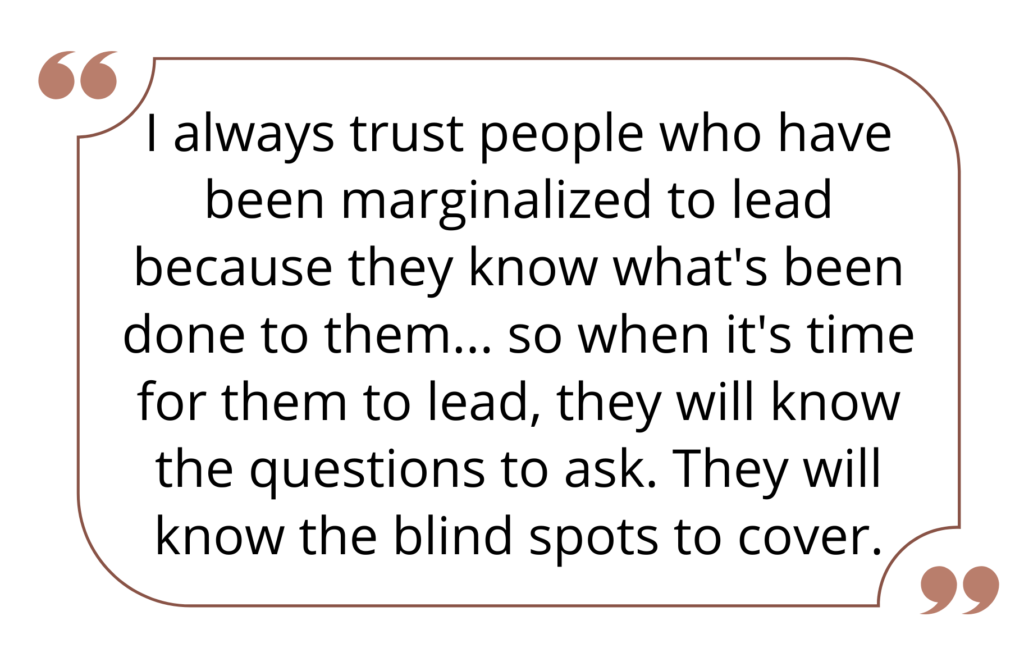 Schnall: I interviewed you last year for a roundup piece called When Black Women Lead, We All Win that I wrote with my colleague Tolu Lawrence. In one of your responses, you had powerfully reflected that “a lot of Black womanhood is based on multiple forms of oppression, which is part of what makes them good leaders… because those who have been trampled upon are the ones who know how to lead best without having somebody else’s head stepped on.” Can you elaborate on that? And also, what are tangible ways that we can best elevate and support Black women’s leadership?
Schnall: I interviewed you last year for a roundup piece called When Black Women Lead, We All Win that I wrote with my colleague Tolu Lawrence. In one of your responses, you had powerfully reflected that “a lot of Black womanhood is based on multiple forms of oppression, which is part of what makes them good leaders… because those who have been trampled upon are the ones who know how to lead best without having somebody else’s head stepped on.” Can you elaborate on that? And also, what are tangible ways that we can best elevate and support Black women’s leadership?
Ajayi Jones: I always trust people who have been marginalized to lead because they know what’s been done to them. They know what it feels like to be placed on the lower totem pole. So when it’s time for them to lead, they will know the questions to ask. They will know the blind spots to cover. When Black women are in positions of leadership, I have more confidence because I know that, because we’ve had certain treatment, we’re not passing that treatment on. We have sensitivities that others might not have. We operate already like the conscience of the world, so when placed in leadership, we’re more prone to show up better.
How can people support Black women in our leadership? Well, support is a verb. People need to believe us, show up for us, pay us, advocate for us. I think those are key things that people have to do, whether we’re in the room or not. People have to put some actions behind what they say is their intention.
Schnall: We’re facing a lot of challenges, from injustice to climate change to a global pandemic. What is your relationship to hope right now? Are you hopeful that we can change our ways?
Ajayi Jones: I’m hopeful about it. You can’t ever lose hope, because if you lose hope, you don’t have anything else. If you become hopeless, then there’s nothing to work toward, there’s nothing that motivates you to get out of bed. So I maintain hope because even in the worst moments of humanity, we’ve come out on the other side of it. In those terrible moments, if everybody lost hope, there would be no other side of it. So it’s our job to hold steady with hope and keep working with the belief that we can put some of the fire out.
For more information about Luvvie and her work visit Luvvie.org
This interview has been edited for length and clarity.
To listen to the full interview, visit the ShiftMakers podcast.
Portions of this interview originally appeared at Thrive Global.
Marianne Schnall is a widely-published interviewer and journalist and author of What Will It Take to Make a Woman President?, Leading the Way, and Dare to Be You for girls. She is also the founder of Feminist.com and What Will It Take Movements and the host of the podcast ShiftMakers.
